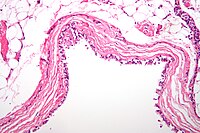
Photo from wikipedia
Enucleation has become an alternative treatment in benign or low-malignant cystic tumors, including intraductal papillary mucinous neoplasms (IPMN). For enucleation to be a safe alternative to the standard procedures, there… Click to show full abstract
Enucleation has become an alternative treatment in benign or low-malignant cystic tumors, including intraductal papillary mucinous neoplasms (IPMN). For enucleation to be a safe alternative to the standard procedures, there must be good access to the resection area. In this report, we present such a route for dorsally situated IPMNs. The head of the pancreas was exposed by an extended Kocher maneuver to the left lateral edge of the aorta. Stay sutures were placed along the second part of the duodenum to allow maximal rotation of the pancreatic head to the left, which exposed the posterior aspect of the pancreatic head. The cystic lesion was then enucleated followed by a protective pancreaticojejunostomy on the resection cavity. Two consecutive patients with IPMNs of the dorsal pancreatic head successfully underwent dorsal enucleation. The postoperative course was uneventful in the first patient, while the course of the second patient was complicated by a clinically relevant pancreatic fistula, delayed gastric emptying, and hospital discharge on day 35. This study shows the feasibility of a dorsal approach to the pancreatic head for enucleation as well as reconstruction by means of posterior Roux-en-Y pancreaticojejunostomy. In very selected cases in specialized centers, cystic lesions in the posterior aspect of the pancreatic head will become amenable to enucleation with preservation of pancreatic functionality. However, more research is needed to clarify postoperative outcomes of this approach.
Journal Title: Langenbeck's Archives of Surgery
Year Published: 2019
Link to full text (if available)
Share on Social Media: Sign Up to like & get
recommendations!